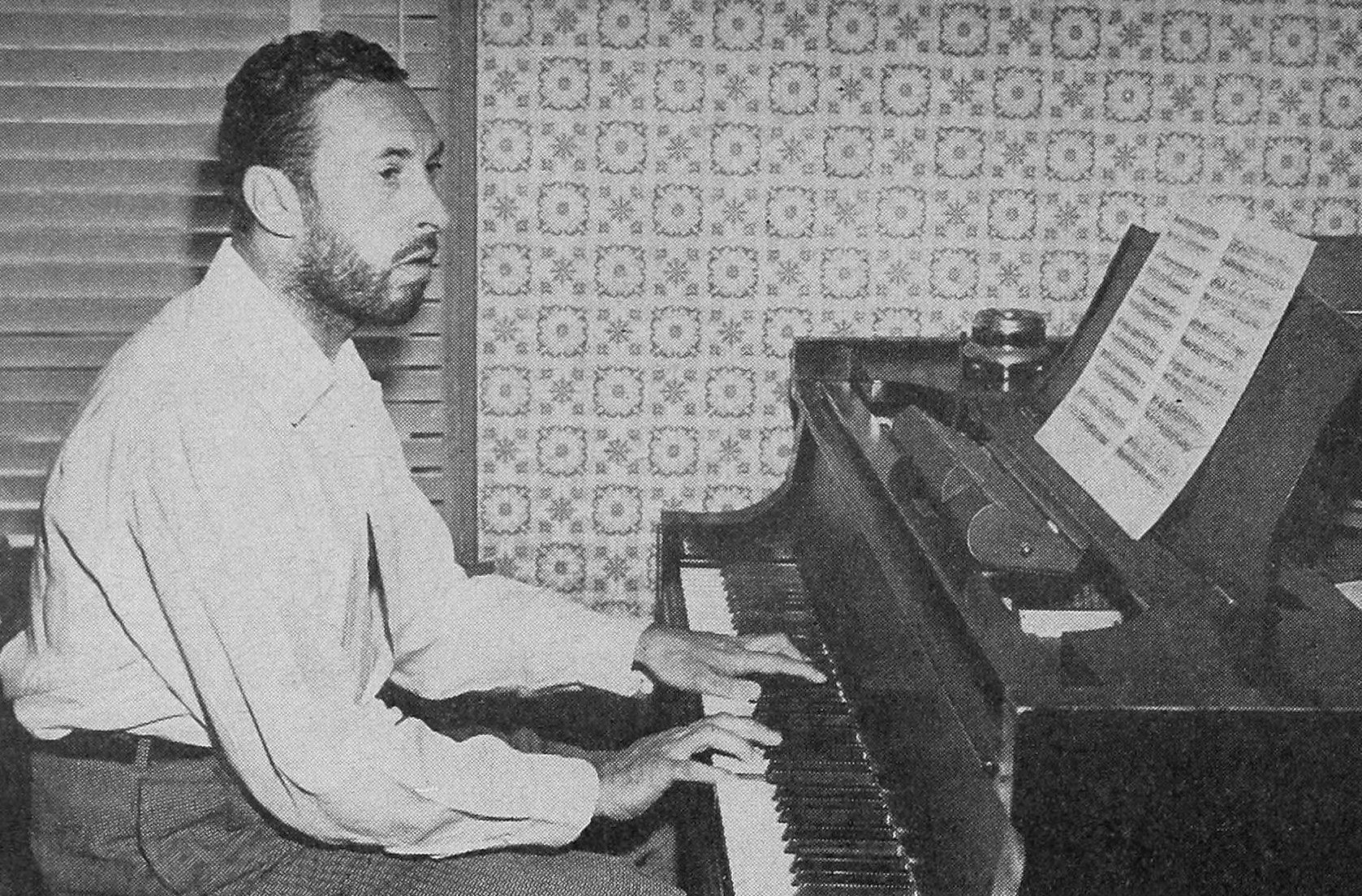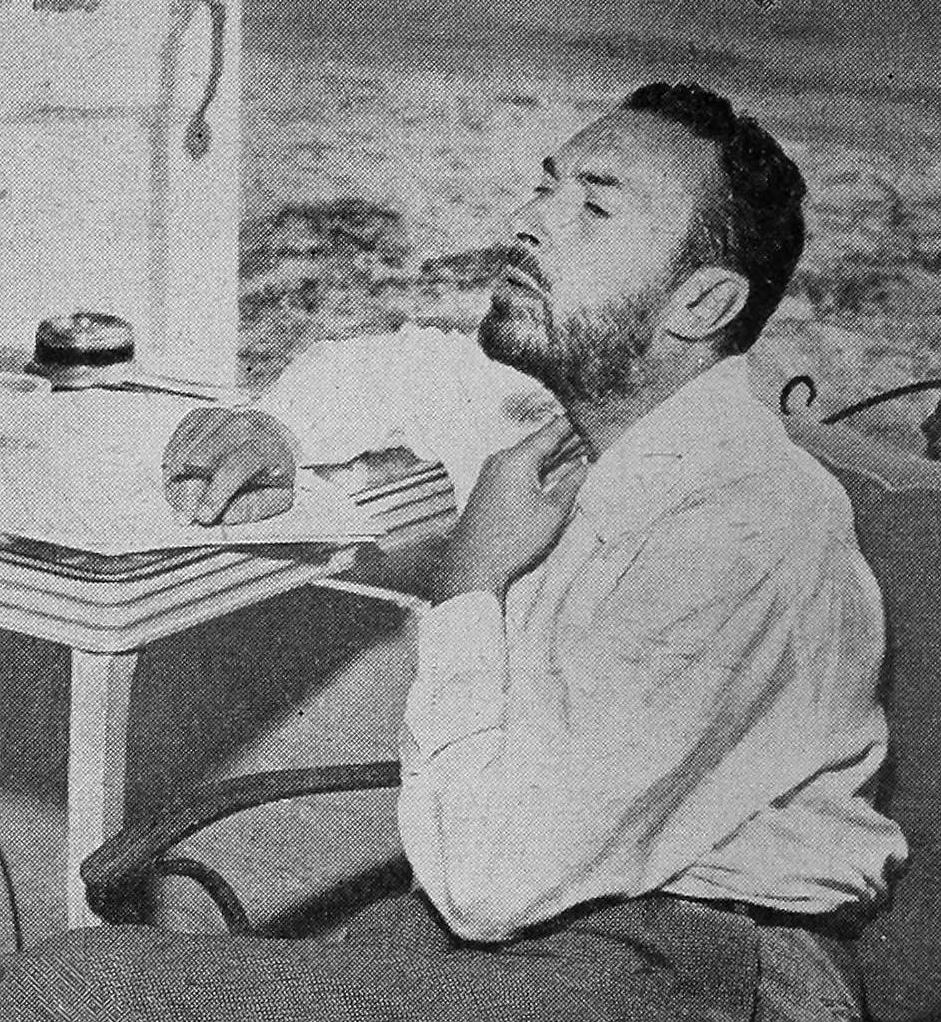Happy Birthday, William Spier!
Posted by Ivan G. Shreve, Jr. on Dec 5th 2013
The man who brought listeners “radio’s outstanding theatre of thrills” (Suspense!) and “the greatest private detective of them all” (The Adventures of Sam Spade) was born in New York City on this date in 1906. The history behind one of the medium’s most creative producers is indeed an interesting one—involving both a love of music and marriages to two individuals as equally entwined in show business as himself.
Upon his graduation from Evander Childs High School, the young Spier worked a series of odd jobs before landing a position at Musical America at the age of nineteen—a magazine then edited by the one and only Deems Taylor. Bill, under Deems’ tutelage, gradually worked his way up to the position of chief critic for the periodical…but even after leaving in 1929 to take a job at the ad agency of Batten, Barton, Durstine and Osborn, Spier would continue his lifelong love of music (as a talented pianist and composer). During his stint as director-producer on Suspense, series composer Lucien Moraweck once observed of Spier: “He knows everything about music. Sometimes he even knows more than the musician.”
It was at BBD&O that Spier honed his radio chops, producing such series as The Atwater Kent Hour, General Motors’ Family Party and Ethyl Tune-Up Time. His crowning achievement before his string of successes in the 1940s was directing and co-writing The March of Time, a show on which he would cement friendships with future Suspense guest stars like Orson Welles, Agnes Moorehead and Joseph Cotten. Spier would leave BBD&O in 1941 to take a job on the West Coast with CBS…and that’s where the saga of Suspense begins.
As director-producer of Suspense, William Spier essentially laid out the ground rules for the dramatic anthology program: the broadcasts would feature tightly-written plays featuring ordinary characters caught up in circumstances beyond their control. The situations that the protagonists would find themselves in had to be plausible; there would be no supernatural nonsense (although Spier occasionally bent this rule, as in the classic “The House in Cypress Canyon”) and the guilty party would pay by episode’s end (though he broke this one, too, in the most famous Suspense episode of them all—“Sorry, Wrong Number”). Bill supervised all aspects of the Suspense productions—voices, story, sound effects and especially music—and he never wanted for guest stars on the show. Many of Hollywood’s top celebrities enjoyed the prestige of the program (Cary Grant was a fan of appearing on the show, noting it was “where I get a good chance to act”). Spier often indulged in offbeat casting on the series (assigning roles to big names like Peter Lorre and Lucille Ball that were out of their comfort zone), and maintained a repertory company of some of radio’s finest utility players, such as Joseph Kearns, Cathy Lewis, Lurene Tuttle and Wally Maher.

In the same year that he began his duties on Suspense, William Spier married a second time (he had been previously married to a woman named Mary Scanlan, with whom he had three children) to actress-singer Kay Thompson, perhaps best known for creating the children’s book character of “Eloise.” (Eloise was modeled after the young Liza Minnelli, the godchild of Spier and Thompson.) Thompson played an important role in the casting of the lead actor in Spier’s next big project. Bill was going to bring Dashiell Hammett’s sleuthing creation Sam Spade to radio, and he had his mind set on any actor who could imitate Humphrey Bogart (since Bogie had been successful playing Spade in the movie version of The Maltese Falcon). Kay lobbied for Howard Duff, an actor whose only notable gig had been as an announcer and producer with the Armed Forces Radio Service during his hitch in the military during World War II. Despite a less-than-stellar audition, Thompson talked her husband into giving Duff the part…and after thirteen weeks, Duff’s takeover of the role would cause many to ask, “Humphrey who?” The Adventures of Sam Spade would be a tremendous success on all three networks—ABC, CBS and NBC—from 1946 to 1951; its cancellation by NBC was due only to nervousness surrounding the politics of author Hammett (who actually had little to do with the program other than collecting a check) and actor Duff, who had been replaced by Steve Dunne in the fall of 1950.
Spier eventually left Suspense in the capable hands of such director-producers as Anton M. Leader, Norman Macdonnell and Elliott Lewis (occasionally returning in-between the hiring of those men) to work on dramatic anthology programs such as The Clock and The James and Pamela Mason Show. Bill divorced Kay Thompson in 1947 and was married (for the third and last time) to June Havoc…an actress who had guest-starred on one of his programs. (In case you were wondering, that made Gypsy Rose Lee his sister-in-law.) Spier would later produce a television sitcom for June at Desilu from 1954 to 1955 entitled Willy that won a few critical raves but not much of an audience. It was not Bill’s first TV project; he had served as producer of TV’s Omnibus in its early years (and also brought a visual version of The Clock briefly to screens). After the cancellation of Willy, his boob tube duties were limited to writing scripts for such series as The Lineup, Peter Gunn and The Untouchables (his two-part script, “The Unhired Assassin,” won him a Writer’s Guild of America award—which went along nicely with his Peabody trophies for Suspense and Mystery Writers of America presentation for Sam Spade). William Spier died on May 30, 1973 at the age of 66.

Since Bill Spier was the individual who helped to craft the tales well-calculated to keep you in…well…Radio Spirits offers first-rate Suspense collections featuring his contributions, including Omnibus and Around the World. But you also don’t want to miss the thrilling adventures of legendary radio shamus Sam Spade in Volumes One and Two, featuring broadcasts with both Howard Duff and Steve Dunne.
Happy birthday to a true radio legend!

